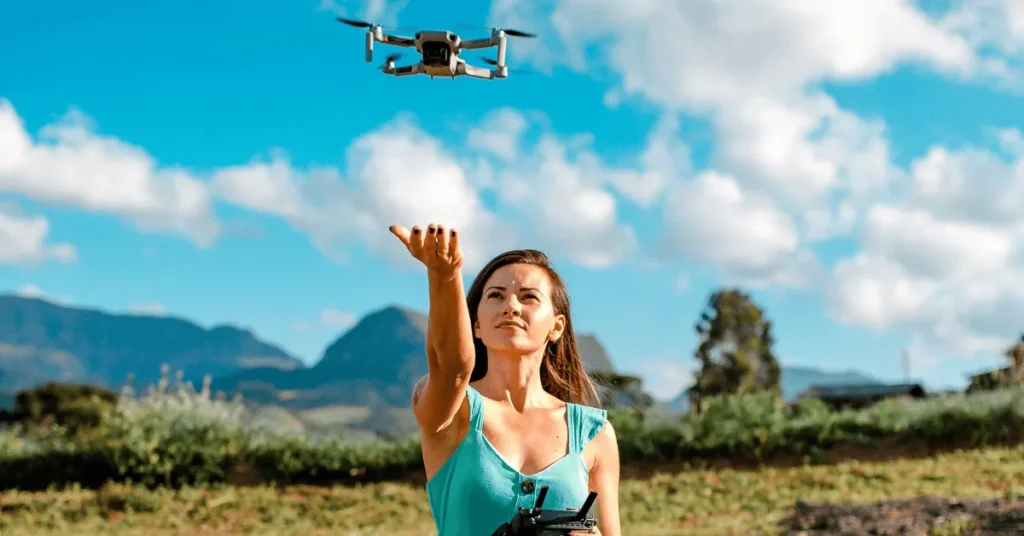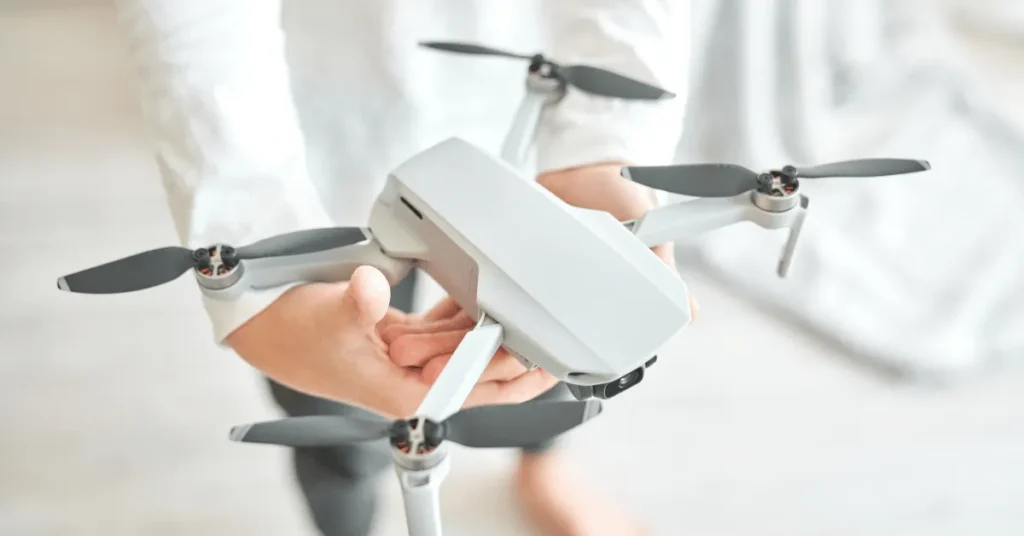Protecting Privacy: Drone Usage in Georgia (2023)

Drones, also known as unmanned aerial vehicles (UAVs), have grown exponentially in popularity in recent years.
These versatile flying machines are revolutionizing various industries, including aerial photography, agriculture, delivery services, and infrastructure inspections.
With their ability to capture high-quality images and data from the skies, drones have become invaluable tools for businesses and individuals.
While the applications of drone technology offer numerous benefits, concerns about privacy and security have emerged, particularly in Georgia.
As drone usage becomes more prevalent, finding a delicate balance between technological advancements and safeguarding individuals’ privacy has become a pressing issue.
In this article, we will delve into the various aspects of drone usage in Georgia, explore the impact on privacy, and examine the regulatory measures to address these concerns.
KEY TAKEAWAYS
- Drones are witnessing exponential popularity and revolutionizing various industries in Georgia, including agriculture, real estate, and construction.
- Advanced drone technology allows for high-resolution image capture and data collection, making them invaluable tools in agriculture and real estate.
- Georgia’s economy benefits from increased efficiency and reduced operational costs due to drone integration, but challenges like privacy protection and airspace management require attention.
- Privacy concerns arise from potential invasive surveillance, unauthorized monitoring of private properties, and public perception of drones.
- The Georgia Drone Privacy Act establishes rules for responsible drone usage and requires consent for surveillance over private property.
- Responsible drone operations emphasize safety guidelines, geofencing technology, public awareness, and education for a privacy-conscious drone community.
What Are Drones and Their Applications?
Drones are remote-controlled aircraft that can fly autonomously or be operated by a skilled pilot on the ground.
Equipped with cameras, sensors, and GPS technology, drones can perform various tasks, from capturing breathtaking aerial photography to conducting critical infrastructure inspections.
Their versatility and efficiency have made them indispensable across multiple industries.
How do Drones Capture Images and Data?
Modern drones have advanced cameras and sensors that enable them to capture high-resolution images and gather valuable data from various angles and altitudes.
This capability makes them indispensable in industries like agriculture, where they can monitor crop health, and in real estate, where they can provide stunning aerial views of properties.
The Rapid Evolution of Drone Technology
The field of drone technology is experiencing rapid advancements, with manufacturers constantly introducing new and improved models.
These advancements have increased flight times, payloads, stability, and control.

As technology progresses, drones are becoming more accessible and affordable, leading to their widespread adoption in Georgia and beyond.
Read More: https://skbestgadgets.com/how-to-unlock-geofencing-on-your-dji-drone/
The Impact of Drone Usage in Georgia
The impact of drones on various industries in Georgia has been substantial. Drones optimize crop management, monitor irrigation, and assess plant health in agriculture.
Real estate professionals utilize drones to showcase properties from unique aerial perspectives, attracting potential buyers with stunning visuals.
Additionally, the construction industry benefits from using drones for site inspections, project monitoring, and safety assessments.
Recreational Use of Drones by Enthusiasts
Drones have also found a place among hobbyists and enthusiasts in Georgia. As recreational drones become more accessible and user-friendly, individuals are taking to the skies to explore new perspectives and capture stunning images and videos.
However, with the rise in recreational drone usage, concerns about privacy and safety have come to the forefront.
Positive and Negative Effects of Drones on Georgia’s Economy
Integrating drones into various sectors has contributed significantly to Georgia’s economy. Increased efficiency, reduced operational costs, and improved data collection have positively impacted businesses and industries.
However, challenges such as airspace management, privacy protection, and potential job displacement also require careful consideration to ensure a balanced economic impact.
Privacy Concerns and Surveillance Challenges
As drones become more prevalent, one of the primary privacy concerns is the potential for invasive surveillance.
Drones equipped with sophisticated cameras and sensors can capture high-resolution images, leading to worries about unauthorized monitoring of private properties and sensitive areas.
Potential Risks of Unauthorized Monitoring of Private Properties
With the ability to fly quietly and discreetly, drones raise concerns about intrusions into private spaces.
Homeowners and individuals worry about their privacy being compromised by drones, with cameras capturing images without consent.

Public Perception of Drones and Privacy
Public perception plays a crucial role in shaping drone usage regulations and guidelines.
Understanding how the general population perceives drones and their impact on privacy is essential in crafting effective policies that balance innovation and privacy protection.
Legal Framework and Regulations
Georgia has enacted the Drone Privacy Act to recognize the need to address privacy concerns. This legislation establishes rules and regulations for using drones for surveillance purposes.
It requires drone operators to obtain property owners’ consent before surveilling private property.
Obtaining Consent for Drone Surveillance Over Private Property
The Georgia Drone Privacy Act mandates drone operators to inform and seek consent from property owners before capturing images or data over their private property.
This measure ensures that individuals’ privacy rights are protected and respected.
Protecting Private Property Rights in the Drone Era
As drone technology advances, balancing innovation and protecting private property rights is essential.
The legal framework aims to safeguard individuals’ privacy while allowing for drone technology’s responsible and ethical use.
Read More: Drone laws in Georgia Country in 2023
Read More: Can I Fly My Drone Over My Own Property in Georgia country?
Ensuring Responsible Drone Operations
Georgia requires commercial drone pilots to obtain licenses and certifications to ensure responsible drone operations.

These requirements involve education on safety guidelines, airspace regulations, and privacy laws, promoting a culture of responsible drone usage.
Safety Guidelines and Best Practices for Drone Operators
Safety is paramount in drones, especially when operating in shared airspace.
Drone operators are encouraged to adhere to safety guidelines and best practices to prevent accidents and protect individuals and property on the ground.
Importance of Geofencing Technology in Preventing Accidental Intrusions
Geofencing technology is a critical safety feature in modern drones.
By creating virtual boundaries using GPS coordinates, geofencing prevents drones from entering restricted areas, such as airports or government facilities.
This technology helps prevent accidental intrusions and enhances overall airspace safety.
Public Awareness and Education
Government agencies collaborate to raise public awareness about drone usage, privacy concerns, and responsible drone operation.
Through educational campaigns, citizens are informed about their rights and responsibilities as drone users and encouraged to be mindful of privacy concerns.
Promoting Responsible Drone Operation and Privacy-Friendly Projects
Promoting responsible drone operation and supporting privacy-friendly projects are essential to fostering an accountable drone community.
By encouraging innovation while respecting privacy, Georgia aims to harness the full potential of drones for the greater good.

Addressing Privacy Concerns and Misconceptions Through Education
Education is vital in addressing privacy concerns and dispelling misconceptions about drones.
By providing accurate information and clarifying misconceptions, the public can better understand the benefits and limitations of drone technology.
Surveillance Oversight and Transparency
Law enforcement agencies must adhere to specific protocols when deploying drones for surveillance.
These protocols ensure that drones are used responsibly, with a clear mandate, and within the bounds of the law.
The Role of Warrants in Drone Surveillance Operations
Law enforcement agencies typically require warrants before using drones for surveillance to safeguard individuals’ privacy rights. This measure ensures that drone usage is justified and that privacy is protected.
Ensuring Transparency and Accountability in Drone Operations
Transparency and accountability are crucial when it comes to drone operations. By establishing clear guidelines and reporting mechanisms, Georgia aims to build trust and confidence in the responsible use of drone technology.
Are drones legal in Georgia?
How can drone operators protect people’s privacy?
What are the penalties for violating drone regulations in Georgia?
Can drones be used for surveillance by individuals other than law enforcement?
Are there any restrictions on flying drones near sensitive areas in Georgia?
What safety measures can drone operators take to prevent accidents?
How does geofencing technology work, and how is it used in drones?
What steps are being taken to raise public awareness about responsible drone usage?
How can I report incidents or misuse of drones in Georgia?
Are there any limitations on flying drones at night in Georgia?
Conclusion
As drone technology evolves, striking a delicate balance between technological innovation and privacy protection is paramount.
Georgia’s proactive approach to addressing privacy concerns and enacting the Drone Privacy Act sets a precedent for other regions seeking to harness the potential of drone technology responsibly.
Georgia’s comprehensive legal framework, public awareness campaigns, and commitment to responsible drone operations are models for other states and countries.
By prioritizing privacy protection, Georgia sets a standard for a privacy-conscious approach to drone usage.
By fostering a culture of responsibility and education among drone operators and the public, Georgia aspires to build a strong and responsible drone community.
Emphasizing the importance of privacy, safety, and ethical usage will enable drones to continue positively impacting the state’s industries and people’s lives.
All images are taken from Canva.com
Can You Fly a Drone Over Private Property in Georgia Country?
“Wondering if your drone can cruise above private land in Georgia Country? 🏡 Get the scoop on the rules in our quick article. Don’t miss out – read it now!”







